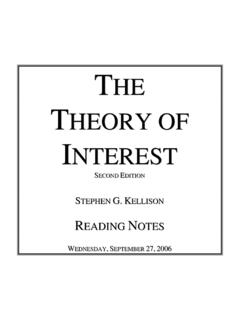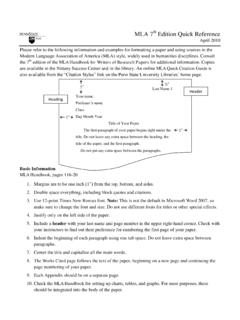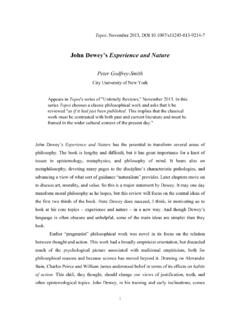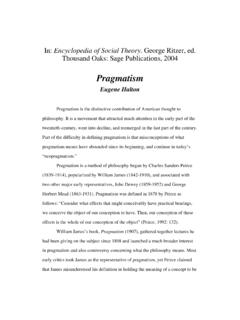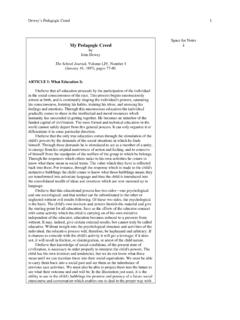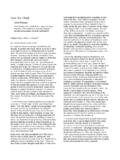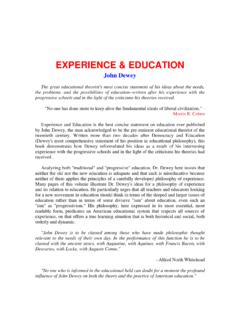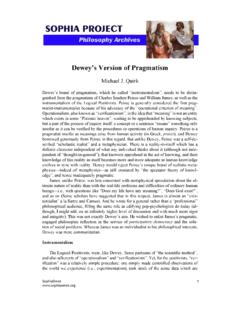Transcription of Democracy and American Mass Communication Theory: …
1 Democracy and American mass Communication Theory: dewey , Lippmann, Lazarsfeld John Durham Peters Author's Note: Thanks to Ann Swidler for valuable suggestions on earlier drafts and Eric W. Rothenbuhler for his criticisms. A University of Iowa Old Gold Summer Fellowship partly supported the writing of this study. ABSTRACT In the early twentieth century "the public" was a key problem for American social theorists perplexed by the social consequences of industrialization and urbanization. dewey 's account of the public (and its problems) laid a foundation for a theory of mass Communication . Later American social science came to take politics as a topic, not the starting point, of study (Lippmann). When mass Communication research faced the vexing issue of mass media/ mass society in the 1940s and '50s, it lacked the rhetorical and theoretical resources to do as much as it could have.
2 This failure has marked research on media and society since and been the basis for many calls that would reconceive the political uses of research. (Key Words: Democracy , mass Communication Theory, Liberalism, dewey , Lippmann, Lazarsfeld). INTRODUCTION This essay treats the development of the discourse of American social science about the mass media. It tells the story of a cluster of narratives that came to lose consciousness of their narrative status. With that loss went a narrowing of horizon: a forgetfulness as to the "politics" (both broadly and narrowly conceived) of mass Communication theory. The essay aims to sketch the general trajectory of American mass Communication theory from the Progressive era to the consolidation of the field in the 1950s.
3 The argument is that much of history of American mass Communication theory and research is an attempt to carry out a political project without being articulate about that project. If you could lay the classic texts of American mass Communication research down on a psychoanalytic couch, you would find that they thought themselves talking narrowly about the mass media and their "effects," while they were in fact talking about the perils and possibilities of Democracy . This political concern appears like an unexorcized demon whenever American social science turns its attention to the media--largely because the commitment to an image of Democracy is unacknowledged. A political concern for Democracy is thus not only a topic of discourse in American mass Communication theory; it is part of the structure of that discourse.
4 Many old American narratives appear in American Communication research in garbled form: the hopes of building a city on a hill that would shine to the nations, of creating a political order in which the free flow of opinions would guarantee the flourishing of human variety and opportunity, and the horror of mental enslavement when opinion becomes too powerful. This essay treats three moments in the development of American mass Communication theory. First, it examines the social thought of John dewey (1859-1952); second, the critique of that mode of thought by Walter Lippmann (1889-1974); third, the social research done by Paul Lazarsfeld (1901-1976) and his associates. Though I focus on these three scholars, their names are intended to represent entire eras and styles of thought.
5 dewey stands for the social thought of the American progressive era (1890s through the 1920s); Lippmann for the rise of a self-consciously scientific, value-free ethos in American social science (1920s and '30s); and Lazarsfeld for the early days of American mass Communication research (1940s and '50s). HISTORICAL SELF-IMAGES: WHAT IS AT STAKE? Why start with dewey ? Placing mass Communication theory's origin in the issues that dewey struggled with helps to solve conceptual incoherence and restore political self-consciousness to American media studies. dewey is appealing because he saw no reason to want a science that suppressed its moorings in values and history. For him, inquiry was a means to create values and to intervene in history; it was one especially fruitful human practice among other human practices.
6 Science was better the clearer it was about its commitments; the self-imposed amnesia or bracketing of values he thought unproductive. dewey started with the question of political order and only later arrived at a conception of Communication . Like many, more recent, students of Communication and culture, he begins with politics, not as an afterthought. His willingness to take Democracy seriously as a category of philosophical consideration and social action may make him today seem noble if antiquated, but he also offers a way of coming to terms with the inherited political narratives of liberalism without degenerating into slogans and trivialities. As James Carey has suggested in several essays (1975, 1982, 1985), dewey 's work can be read as providing the resources for an indigenous American tradition of cultural studies.
7 dewey , in short, is the path not taken by American mass Communication research. According to its conventional self-understanding, in contrast, American mass Communication research emerged during the years between the wars as social scientists of various stripes began to do empirical research on topics such as propaganda ( Lasswell, 1927), movies ( Blumer, 1933), mass media generally (Willey and Rice, 1933), and radio ( Lazarsfeld and Stanton, 1942, 1944, 1949). A good example of this vision of the field's history--as originating more or less contemporaneously with the broadcasting industry and being strictly a matter internal to the history of empirical social science--can be found in the widely cited claim of Wilbur Schramm, himself a chief institutionalizer of the field, that Communication research has four "founding fathers": Paul Lazarsfeld, Harold Lasswell, Kurt Lewin, and Carl Hovland (Schramm, 1980).
8 To look at the rise of mass Communication research as we now recognize it, however, is to arrive too late on the scene to understand its intellectual history and character. Self-images now in power may exclude forms of research and ideas which once in fact were crucial but since have become embarrassing. As Sproule shows (1987), for instance, propaganda analysis was crucial in getting research on mass media off the ground in the 1920s and '30s, but was later systematically forgotten. All histories of academic enterprises tend to have something patricidal about them: embarrassing intellectual paternities are suppressed and preferred ones put in their place. So too with mass Communication research: its institutional birth happened only long after its intellectual problems were established.
9 mass Communication theory and research, again, is a voice in an ongoing conversation about the meaning of American Democracy that has rarely recognized its participation in that conversation. Extending the history of the field back nearly half a century in order to include debates about Democracy in the Progressive Era gives a more coherent account of the problems with which the field has struggled and helps to articulate what precisely is at stake in the study of the mass media and what the potentials of that discourse are. American thinkers such as dewey , Charles Horton Cooley, and Josiah Royce deeply felt the coming of the twentieth century with all its disruptions (Quandt, 1970). For them, the world was out of joint. Industrialization and urbanization had forced them to live in a world different from the remembered world of intimate communities they were born into.
10 In a moment of exaggeration dewey quipped that only geographically did Columbus discover the new world: the genuine new world only came into existence in the machine age. Progressive social thought can be construed as an attempt to answer the question: what are the prospects for Democracy in a society no longer based on face to face communities? Is the vision of each "man" determining "his" own fate obsolete in a society of such colossal scale, where things are in the saddle and ride mankind? Is political participation a chimera in a society of displaced city-dwellers and uprooted immigrants? There are two basic responses. One is a nostalgia for the small community and an attempt to create a nation-wide "community of communities" (to use Richard Bernstein's phrase [1986]): the approach of such thinkers as Royce, Cooley, Park, and dewey (Quandt, 1970).




